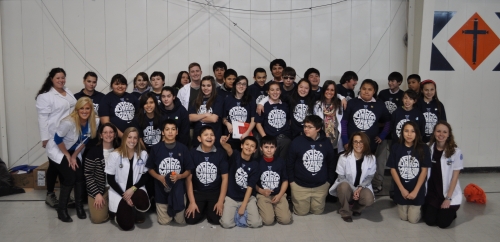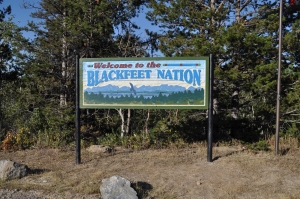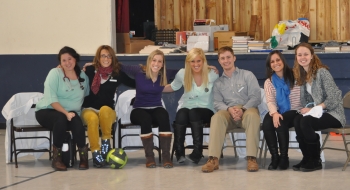Valuing health and culture with the Blackfeet Nation

The Villanova Nurses take a few moments for a photo with the children of the De La Salle School who are wearing their Villanova basketball shirts. The sport is a favorite among the children.
Just east of Glacier National Park in Browning, Montana sits the Blackfeet Nation, an Indian reservation home to the Blackfeet Tribe. With 1.5 million acres of breath-taking landscapes, it is bigger than the state of Delaware and is the third largest reservation in the state. But there among the sprawling white-tipped mountains rests a community of Native Americans struggling with chronic health care conditions, addictions and disturbingly-high rates of high school drop outs.

Though Villanova had a previous relationship with the community in Browning through the Little Flower Parish, the College of Nursing recently renewed this connection by creating a pediatric clinical practicum opportunity for second degree accelerated BSN students to help meet the needs of the people in the Blackfeet community.
Eight students travelled to Montana during their 2013 spring break in March. Clinical Assistant Professor Michelle M. Kelly ’94 BSN, ’12 PhD, CRNP guided the students as part of the first clinical opportunity offered exclusively to second-degree students.
With this experience in its inaugural year, the students were uncertain what to expect and had much to prepare. Set to teach health classes for grades 4-8 at the De La Salle Blackfeet School, they created a broad range of lessons plans covering topics such as nutrition, exercise, body image and addictions.

“One thing I love about nursing besides the patient care is the education,” explains Theresa Testa, one of the second-degree students who travelled to Blackfeet Nation. “Going to the reservation and educating children about healthy behaviors was the perfect opportunity to test my knowledge and teaching skills as a future nurse.”
The De La Salle School is operated by the La Salle Christian Brothers, with a teaching staff comprised primarily of volunteer teachers and an operating budget dependent on financial donations. The mission of the school is to teach the students to “value education.” Capitalizing on the unique backgrounds of the second degree students, the nursing students presented a career skit for the school children that incorporated their education and professional backgrounds. The skit culminated in tying all those backgrounds into varied opportunities within the nursing profession; giving the children an opportunity to envision life after De La Salle.
The De La Salle School has no school nurse, nor does it have health records for the children. Addressing this need, students created a template providing the school with sustainable means to keep yearly health records of the children. Also, to better motivate the children to incorporate what they learned about healthy lifestyle changes, students gave them pedometers illustrating how walking is a simple way to include exercise into their everyday lives.
In addition to teaching at the school, students had a chance to visit the Indian Health Service Hospital—a community hospital resting beneath the “Shining” Mountains of the rugged Northern Rockies. The facility is equipped to address all the health care needs of the community, including emergent and preventative care. However, students found that the primary care physicians are rarely utilized; an alarming revelation with a population that is plagued by preventable, co-morbid conditions.
The nursing group was fortunate to meet with several members of the Blackfeet tribe including Father Ed Kohler and Deacon Running Crane from the Little Flower Parish. Dr. Mary Desrosier, a family physician and enrolled member of the Blackfeet Nation, has children attending the De La Salle Blackfeet School and also met with the nursing students. The group learned about the Blackfeet culture and gained a more intimate understanding of the health realities of this Native American Reservation.
As their faculty mentor Dr. Kelly said, “Every day I was amazed by the determination, flexibility and compassion the nursing students displayed while at the school and in the community. They listened; they asked questions and they suggested ways to improve the health of the children and the community. The health record that was put in place will allow for follow up year to year. Each student left with a desire to return to Browning, and I believe that many will.”
